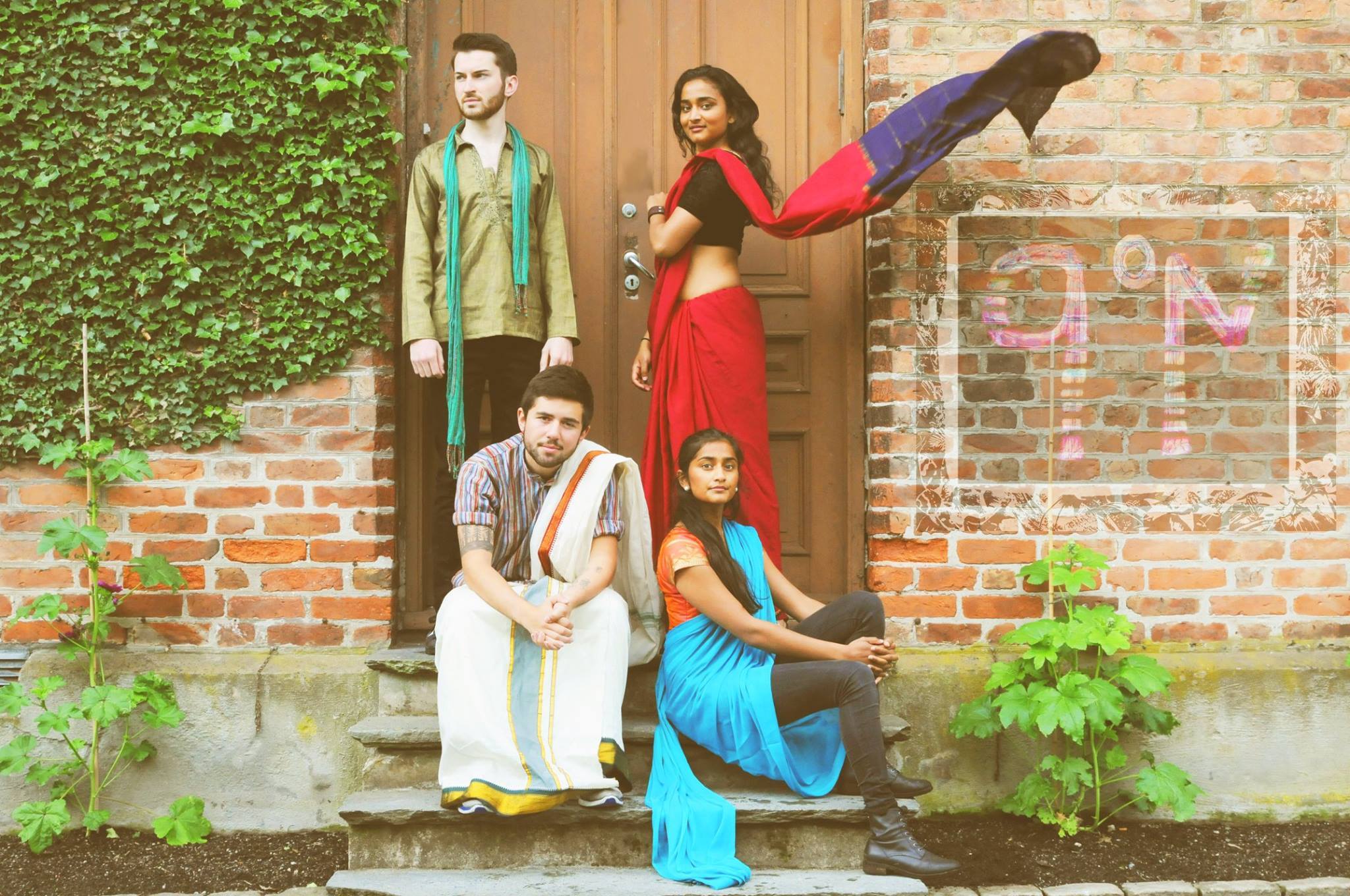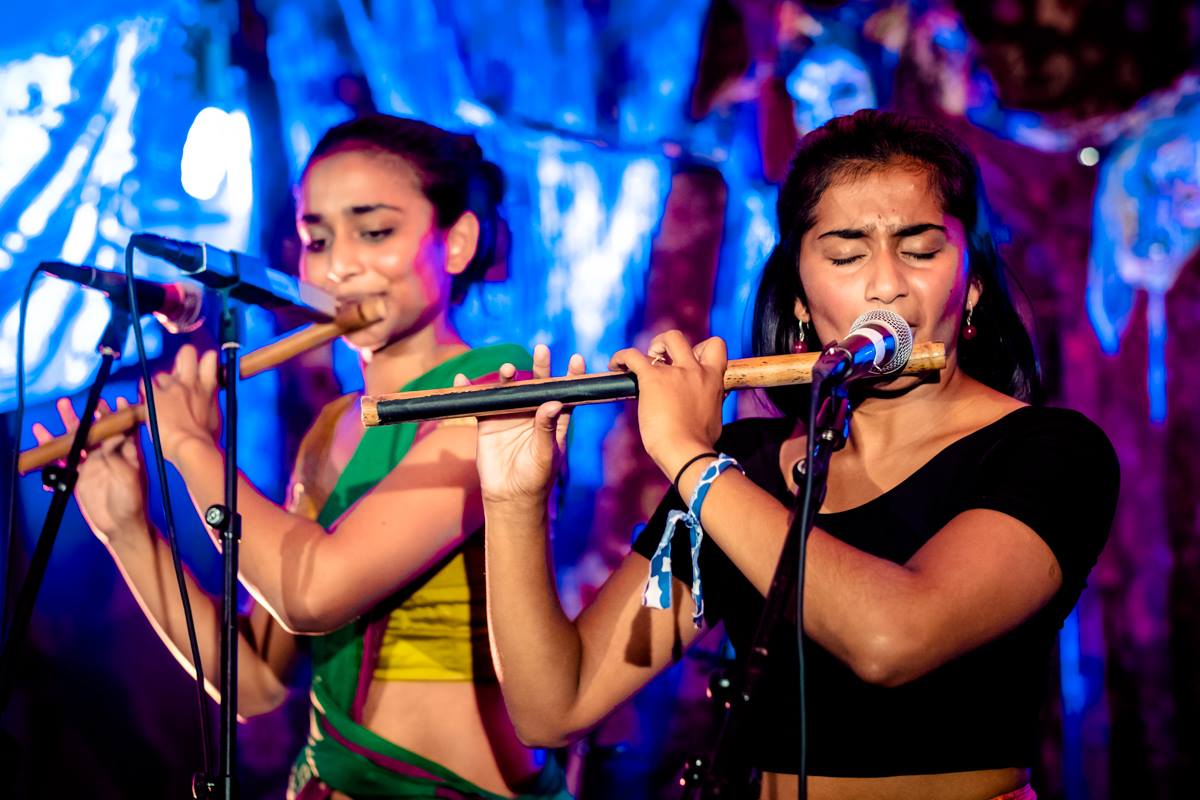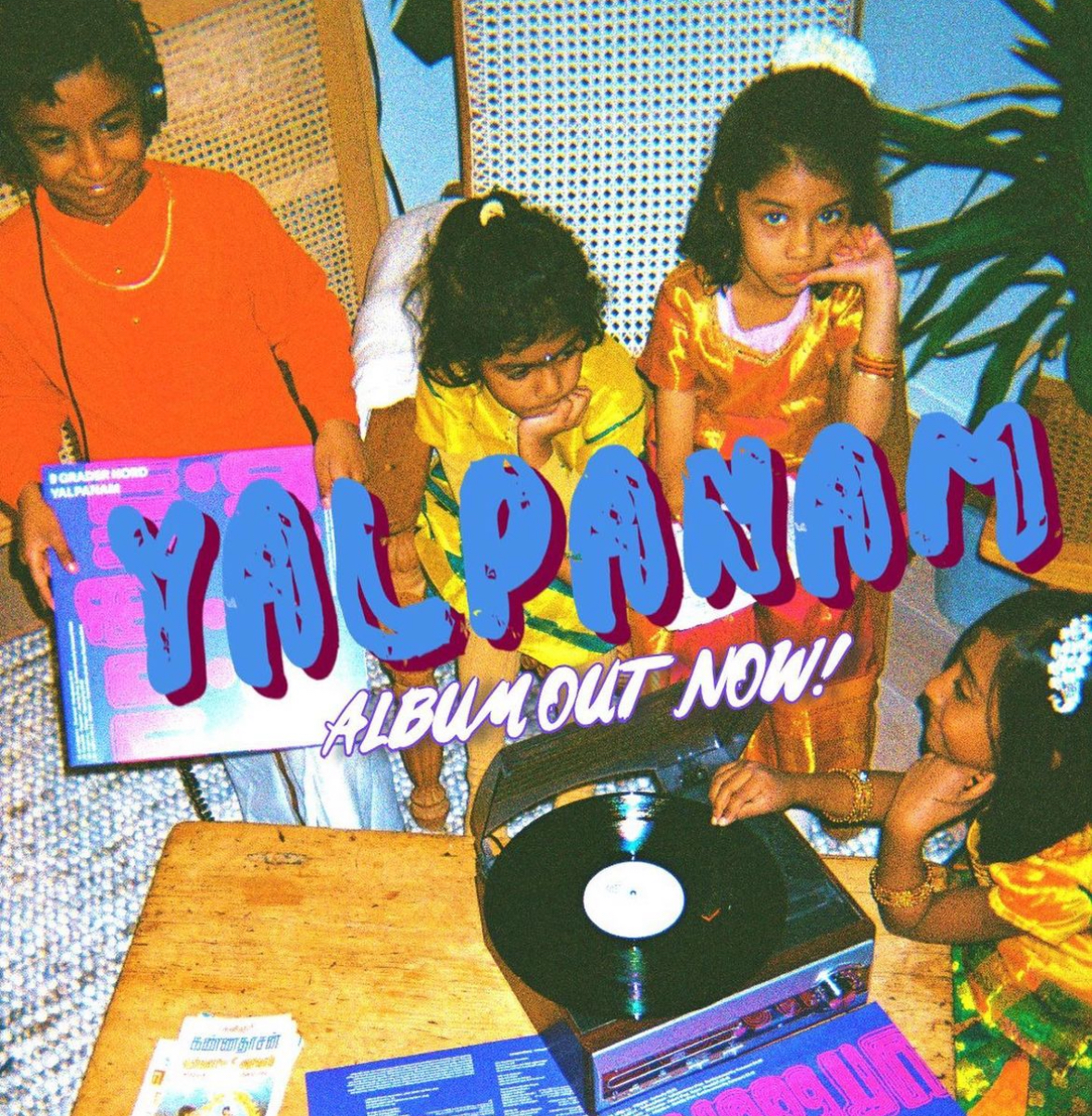Mira and Dipha Thiruchelvam, of the award-winning Tamil folk rock band 9 Grader Nord, sat down with Tamil Guardian to speak about their music; life in Norway as second-generation Eelam Tamils; and for Eelam Tamils to find their own voice.
This interview comes as the band has just won the Spellemannsprisen, often described as 'Norway’s Grammy Awards’, for their latest album “Yalpanam” - the historic Tamil name for Jaffna prior to colonialism. The band’s name is a reference to the fact that the coordinates for Jaffna are 9 degrees north of the equator.
Accepting the award, the band said,
Through this album, we have tried to preserve and honor our Tamil culture, history, and language, which is still threatened in Sri Lanka. We see this injustice in many other places around the world, and we are grateful for the opportunity to use our voices to draw attention to this.
Receiving such an award for an album that reflects upon on their Tamil identity meant alot for the sisters who came straight from Yalpanam, 9 degrees north of equator, to the award ceremony in Oslo, Norway.
Speaking to Tamil Guardian the two sisters expanded on this, noting that their statement comes in the wake of the ongoing atrocities against the Palestinian people in Gaza. “It is a devastating history that we also share,” Mira said. She added that it was additionally sentimental as they had recently visited Mullivaikkal, the final site of the Tamil genocide, and felt the need to raise this whilst accepting this award.
“Our parents raised us well and ensured that we learned Tamil at home and were comfortable speaking it. Tamil culture and history are important to us and it’s because of the sacrifices they went through and the journey they made that we are able to stand here, why we can stand here and be proud of our heritage, be proud and sing in our mother tongue. We felt this was important to emphasise in our speech”, Dipha added.
‘It’s been a really fun journey’

Photo credit Mundo Sonoro
Mira and Dipha Thiruchelvam grew up in Bergen, Norway, and whilst there was a sizeable Tamil diaspora in the region, the Tamil community often found itself living in fragmented areas.
“At school, we became well practised at hiding our identity and often shy over the fact that our parents didn’t speak perfect Norwegian or had another background. But when I turned 18/19 I had a sudden urge to show that I’m not afraid of who I am. This was the impetus behind our first album, “Jaffna”. A need to show the raw form of our Tamil culture, it’s why we are wearing traditional saris and chose to sing in Tamil,” Mira told Tamil Guardian.
“Before this, I was very shy to wear a sari on the bus out of fear that people would think that we haven’t integrated into Norwegian society or don’t know the language," said Dipha. "This was our way of showing that we’re not afraid of who we are – it was a way of bridging our culture and that of Norwegian culture”.
Speaking about their upbringing the sisters noted that their father served as a powerful inspiration and was their flute teacher.
“I think the reason why we have an open mind towards music is because we didn’t. have strict rules on how music should be. Our father was our teacher but he was also learning alongside us. We would listen to the CDs together and try to understand what the flute was, how the ragas worked and how to string it all together. I think this made us more independent,” Mira noted.
“Often we see people learn instruments for a sense of discipline but I worry that this ignores that sense of creativity, that sense of joy and togetherness, that music can help unify a community”, she added.
Speaking on her influences she spoke of her traditional Norwegian upbringing and went through her self-confessed, “emo phase” of listening to metal, Linken Park and rock. “These helped me to cope and to deal with my inner frustrations” she continued. The sisters also said that as children of the 90’s legendary Tamil composer A.R. Rahman had a huge influence on them.
They detailed their journey to form a band followed speaking with a Norwegian music producer who put them in touch with Jakob Sisselson Hamre, and Jakob Sønnesyn Mira, who support the instrumentals behind their music.
“In the 8 years since forming the band, we’ve been touring a lot and playing at concerts, small clubs and big festivals," said Dipha. "Throughout this we’ve been singing in Tamil and we get the audience to sing along with us. It’s really fun seeing everyone sing along in Tamil, even if they don’t understand all the words. It’s been a really fun journey.”
Moving beyond exoticism
 Photo Credit: Audunbakken
Photo Credit: Audunbakken
Speaking about their experience performing in front of mostly Norwegian audiences the sisters noted that for the crowds it was certainly something novel.
“It was very new to see someone performing in their mother tongue and in their traditional clothes. I think in some ways there was a sense that the audience was exoticising us and our second album, “Yalpanam” is kind of a response to this. To say that we’re not just objects to be displayed for Western communities and that we have our stories, our own history, and our own struggles that we want to show. I feel it’s a bit more rebellious” Dipha stated.
“Our second album is totally different from our first in that it digs deeper into our roots. It’s not about convincing the Norwegians, it’s about finding ourselves and digging into the more vulnerable parts between the two cultures” Mira explained.
Speaking about their music they note that whilst they do wear traditional sarees, they will also wear non-traditional clothing. "It is in my view, very unique in a Norwegian context and difficult for some people to grasp. We want our audience to see beyond the traditional clothes or the exotic lens and it is our job to portray the music in the way that we want people to digest it” Dipha noted.
Viduppu
Asked about the song Viduppu, the sisters noted that this was a good illustration of the duality of being a Norwegian Tamil.
The lyrics of the song read:
"The one you saw yesterday in the short dress, that was indeed me, The one hiding the bottle in the dickey, that was indeed me, The one acting like a foreigner, pretending not to know Tamil, that was indeed me…"
Reflecting on their upbringing Mira noted that their parents were strict with them in terms of nightlife and drinking alcohol. “People are partying, having fun, and trying to figure out who they are – but we’re not talking about it," she said. "That’s what the song is trying to get at.”
Dipha added that whilst they were initially strict, they were incredibly supportive of the sisters and have accompanied them to festivals and bars to see them perform. They also noted that in the household there was not a sense of segregation between men and women.
“In our family, everyone sits around the table and it creates a dynamic of generational change and with our family, we have big personalities so we were exposed to radical ideas through the dining room” Dipha noted. “I wouldn’t say they were 100% strict, they were when we were growing up but they kind of grew up with us and we kind of had to make them understand with us”.
Mira joked that whilst the song is about reclaiming Tamil identity, “it also paid tribute to all the uncles hiding their bottles because I feel that’s a very good time”.
“Growing up we were always afraid that our parents would say “oh god what will people say about you? Why are you wearing this short dress? Or the sense of dread if an uncle caught us with a boyfriend or coming back from a late night out. We were trying to capture that in this video” added Dipha.
Vayppu
The sisters also spoke about their hit song Vayppu, which details the story of the first generation of Tamil refugees who came to Norway in the 1980s and worked in the Tamil fishing industry.
The caption under this song reads:
“They were thankful for the opportunity, obeyed the rules and did not question the injustice of the system. They worked in the fishing industry. The first tamil refugees. In search of protection and freedom. Like a hamster on a wheel, endlessly spinning. Loyalty binds us, and we keep reproducing our system”.
“Tamils in Norway gained a positive reputation because they worked extremely hard and were loyal to the system. Often, they didn’t question the system because they had just gone through a war. They had lived in Sri Lanka where their rights weren’t respected” they said.
“It’s a tribute to their sacrifice but it’s also about not being silent or ignoring how the system exploited them. It’s often the typical thing to be thankful to Norway just for having that opportunity but we must question why we’re thanking the white man. It’s about getting people to reflect on the system and if we’re reproducing these injustices. We’re a product of a global system that is racist towards coloured people. Our people have suffered under imperialism. So, it’s deeper than just being grateful to Norway. It asks what we should do now”.
Dipha added, “It’s important that the first generation came here, and we’re of course grateful for their sacrifice, but as the second and third generation we have the freedom to do whatever we want. Now that we have that opportunity, we must reflect on this. It’s our duty”.
The sisters noted that the song itself was a source of disagreement at the dinner table with their parents still feeling a strong sense of indebtedness to Norway and that they shouldn’t question the rules.
Victoria
The last song that Tamil Guardian discussed with the sisters was entitled, “Victoria”. Inspired by the poetry of C. Subramania Bharati, “Victoria”, is a powerful ballad that encourages women to break through barriers and show no fear.
Speaking on the song, Dipha paid tribute to her parents stating they let them be both Norwegian and Tamil. “It’s hard finding the sweet spot – to hold on to your identity whilst also being about to integrate with your school friends or the broader community. We didn’t have any brothers growing up so I think our parents put in a lot of effort to raise us as independent women”.
“I think you can see that on stage as I’m not really afraid to express our feelings. When I sing, it’s bold. I remember getting comments when I was younger that I shouldn’t talk too much or hold too many opinions but my parents never told me to be anyone else but myself. Through music, I am able to express myself”.
She also noted that her sister, Mira, was a strong inspiration for her performance, seeing her move from molecular biology to “being a 100% freelance musician, touring the world with big artists, it’s a really big inspiration”.
Mira responded recognising her sister as a big inspiration for herself. “I have to say that having a sister who is not afraid of expressing herself on stage is very important for the songs and how I compose the songs. I couldn't have made this song with a lead vocalist who sings very sweetly and humbly with a high pitch. I need someone powerful, I need a better version of me to express the song. I need my sister”.
Eelam Tamils need to find their voice

Asked about inspirations they saw growing up, Mira noted that she drew inspiration from a variety of sources instead of individuals from a specific identity.
“In part this was unavoidable as whilst you may have female singers, often those songs are written by men and detail male fantasies or narratives- these failed to inspire me," Mira lamented. "I know there are a lot of talented Tamil female artists, but I feel that the Tamil art industry is still very male-dominated and we are often not seeing strong Tamil women being represented. We still have a way to go.”
She stressed that she felt it was important “to inspire more Tamil artists to be true to ourselves and our community”.
“Adayaalam is the last song of our second album is about this. It has destroyed me as an artist, destroyed my self-esteem, that we don’t support Eelam artists. We support Indian Tamil artists, but we don’t support our own artists […] Yes we are Tamil, but we are Eelam Tamils. We have a unique history, we have a big diaspora community, we’ve been through a genocide, we’ve suffered discrimination, our story is very different from that of Indian Tamils.”
“Adayaalam is about singing every day, making these songs, and you're expecting your own people to show up to your shows, but often Eelam Tamils are not showing up. I’m not saying people have to support us just because we’re Tamil but we’ve been performing for 8 years and I’m curious as to why we’re seeing this tendency in our community” she explained.
“We do see people interested in Tamil Eelam which is great, but I think we should be thinking beyond the geographical boundaries, and think about supporting each other and growing as a people” she added.
“If we want an Eelam Tamil culture or our unique history to grow, we have to stop reproducing Tamil Nadu culture and find our own voice”.
_____
See and listen to more from 9 Grader Nord on their Instagram page here and Facebook page here.
